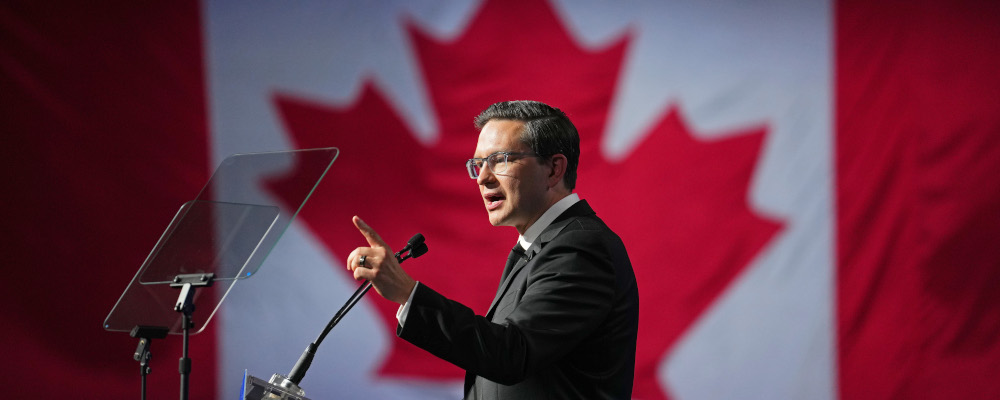This past weekend’s Conservative Party leadership convention brought a merciful end to the campaign which started in earnest back in February when the Conservative parliamentary caucus invoked the Reform Act to sack Erin O’Toole as the party’s leader.
The Hub’s analysis and reporting of the leadership contest similarly kicked off then and continued through to the final announcement, including a weeks-long series on the intellectual and political factions that comprise modern Canadian conservatism, as well as David Frum’s invaluable advice for an incoming opposition leader.
Our contribution was less about scoring the political ups-and-downs of the campaign—though there was some rank punditry—and more about focusing on Conservative Party’s philosophical and policy bearings in the current political moment.
Poilievre’s decisive victory over the weekend is the culmination of the leadership campaign and The Hub’s recent focus on the intra-movement exercise. The main question now for the party’s new leader is about how he comes to define himself and priorities with a Canadian public that is far less familiar with him than the commentariat. As occasional Hub contributor Dan Robertson put it: “congratulations, that was the easy part.”
If his victory speech is any indication, Poilievre seems likely to play up his own personal story of social mobility and the need for public policy to strengthen the conditions for Canadians to climb the economic and social ladder. His message implicitly borrows from mid-twentieth century Australian prime minister Robert Menzies who famously spoke of the “the great and sober and dynamic middle class, the strivers, the planners, the ambitious ones.”
As Poilievre similarly set out in his closing refrain:
We will restore Canada’s promise—in a country, where it doesn’t matter who you love. Or if your name is Smith or Singh, Martin or Mohammad, Chang or Charles. A country where the dreamer, farmer, the worker, the entrepreneur, the survivor, the fighter, the ones who get knocked down but keep getting back up and keep going, can achieve their purpose. A country where the son of a teenage mother adopted by two teachers can dare to run for Prime Minister of Canada.
This is, in my view, a positive development. I’ve previously written that social mobility ought to be the anchor of Canadian Conservative politics. Such a “cause-driven conservatism” can bring coherence to Conservative ideas and policies, unite the different factions of Canadian conservatism, and effectively contrast with the Trudeau government’s emphasis on inequality and redistribution.
There’s evidence to back up the idea that the conditions for social mobility require attention. Although Canada’s record on social mobility is generally positive—we’re regularly in the upper tier of OECD countries—the mobility picture differs among places and groups, and new data suggests that overall social mobility is declining. As economist Charles Lammam recently explained in a Hub Dialogue, these trends are “reason enough for us to have the conversation about, ”what can policy do to foster greater mobility?”.
People are sensing it too. Polling tells us that more than six in 10 Canadians are pessimistic about the future of the next generation. A 2017 survey showed that nearly 70 percent anticipate that today’s children will be worse off than their parents.
This feeling that middle-class progress has stalled is, according to Ipsos Public Affairs CEO Darrell Bricker, driving a lot of the frustration that we’re seeing expressed in our politics including the recent Conservative leadership campaign. It manifests itself in thwarted aspirations about homeownership, growing concerns about job precarity and financial instability, and just a general sense that the country’s economic and social ladder has been pulled up out of reach from younger generations.
A social mobility agenda is also more responsive to real public concerns than the Left’s narrow focus on inequality and redistribution. Research by leading psychologist Paul Bloom and his co-authors finds that most people are actually prepared to accept high levels of inequality—in fact, even higher levels than we currently have—if they are satisfied that the economic and social model is broadly fair. As they wrote in an accompanying Wall Street Journal op-ed:
We think that many of these equality-obsessives are in the grips of a false consciousness. They fail to distinguish worries about inequality from worries about unfairness. They are confused about what they really want. Human beings, the research suggests, are not natural-born socialists, but we do care about justice.
This suggests therefore that the problem is less about unequal outcomes and more about a nagging sense that our meritocracy is still too closed off. It still matters too much who your parents are or where you live or how many educational credentials you have. Our egalitarianism is still too conditional.
Poilievre, who was adopted from a teenage mom and then married a first-generation Venezuelan immigrant, is uniquely positioned to advance these issues. He personifies the “striver” that Menzies spoke about more than 80 years ago—especially relative to the prime minister who was born somewhere between third base and home plate.
The key though will be to translate this compelling message into an actual policy agenda. There’s insufficient word count here to outline it in great detail. But it will necessarily manifest itself across a wide number of policy areas including the economy, childcare and other family policies, housing, education, criminal justice, immigration, mental health and addiction, and so forth. It must also pay particular attention to the circumstances and challenges facing Canada’s Indigenous peoples for whom opportunity and advancement is still too often out-of-reach.
The main point here is that the animating idea of restoring the “Canadian promise” can form the basis of a compelling message and an energetic yet conservative policy agenda. Poilievre and his team should dedicate themselves to such a political vision rooted in his own life experiences and directed to the strivers among us. It’s a definition of his policies, priorities and values that’s bound to find a large audience.
Recommended for You

‘Industrial transformation’: Carney and Smith’s big deal for a new oil pipeline in Five Tweets

‘America’s word is no longer good’: David Frum on the Ukraine-Russia peace plan and the rise of the extremist Right in America

How Moonshot Zones could kickstart Canada’s AI-driven industrial future: Hunter Prize 2025

One Canadian economy? Not quite yet




